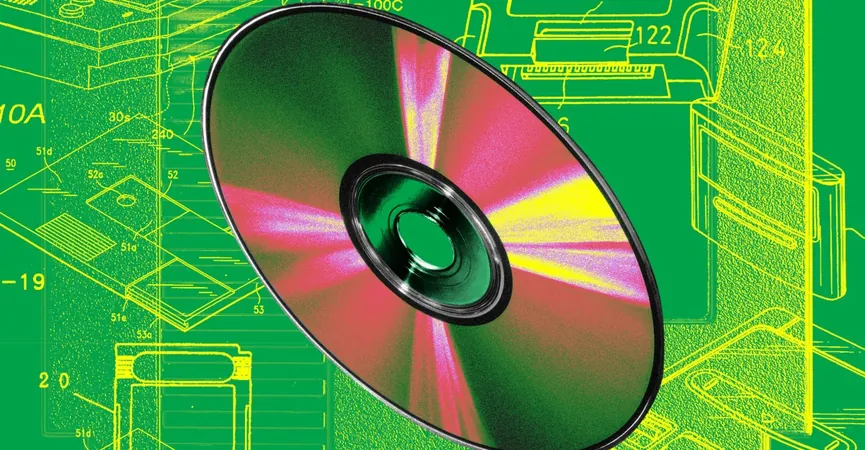
Are Physical Video Games on the Verge of Extinction?
2025-03-31
Author: Jia
Are Physical Video Games on the Verge of Extinction?
In the world of gaming, nostalgia often collides with modern technology, raising an intriguing question: how long will physical video games linger in our digital age? A reflection on the past reveals the massive shift taking place, with indicators that the end of physical games may be nearer than we think.
A memorable moment in gaming history is encapsulated in Sony's iconic “Official PlayStation Used Game Instructional Video.” In this short, humorous advertisement, a simplistic guide underlined one fundamental truth: sharing games used to be as easy as handing a friend a disc. This advertisement served not only to promote the PS4 but also to poke fun at Microsoft's controversial digital rights management (DRM) policies, which were met with public outcry. The backlash prompted Microsoft to reverse its policies shortly after Sony's ad aired, a clear lesson in understanding consumer sentiments towards physical ownership.
Fast forward to today, and physical video game sales have plummeted, declining more than 50% from their peak in 2021, according to Circana analyst Mat Piscatella. The reasons are multifaceted: increasing digital distribution, a reduction in retailers dedicating space to physical games, and a marked shift in consumer preferences toward convenience. With approximately 99% of gaming consoles connected to the internet, players have discovered that digital games allow for seamless accessibility, often favoring this modern model over the traditional allure of physical copies.
The release of all-digital console variants, like Microsoft's Series S and the upcoming PS5 Pro sans a disc drive, further symbolizes this shift. Digital gaming options have become central to companies’ strategies, with services like Xbox Game Pass offering vast libraries of titles without the need for physical media. It raises the question—can we envision a future where iconic franchises like Halo are not available in physical format?
Sony's approach appears more cautious, possibly due to its larger active user base. With millions of PS4s and PS5s sold, there remains a significant market for physical games—especially major titles like Call of Duty that still generate substantial physical sales. Yet, the winds of change are undeniably blowing.
In contrast, Nintendo showcases a hybrid future where physical games could persist longer. The newly announced Switch 2 will continue to support cartridges and maintain compatibility with previous games. Nintendo's family-oriented audience appears to prefer tangible game cards for sharing among children, but even they are beginning to explore digital sharing systems, signifying a gradual departure from traditional physical formats.
Notably, while the sales figures for physical video games dwindle, there has been a surprising surge in the market for physical accessories related to gaming. As Professor Joost van Dreunen from NYU points out, sales of gaming peripherals have soared, revealing a growing interest in customizing the gaming experience— a trend that extends even to theme parks designed around popular franchises.
Ultimately, the digital transformation of gaming resembles the path of vinyl records—once thought dead, they found a niche audience among enthusiasts. However, the exclusivity tied to video game physical media, where a cartridge is limited to one console, illustrates a more complex scenario.
As we look to the future, it appears that while physical media may not disappear entirely, its prominence will undoubtedly diminish. With gaming's relentless march towards a digital-first model, the next time we witness a guide on sharing games, it may very well be in a format that fewer and fewer players associate with discs. Are we ready to say goodbye to the beloved physical video game? Only time will tell.



 Brasil (PT)
Brasil (PT)
 Canada (EN)
Canada (EN)
 Chile (ES)
Chile (ES)
 Česko (CS)
Česko (CS)
 대한민국 (KO)
대한민국 (KO)
 España (ES)
España (ES)
 France (FR)
France (FR)
 Hong Kong (EN)
Hong Kong (EN)
 Italia (IT)
Italia (IT)
 日本 (JA)
日本 (JA)
 Magyarország (HU)
Magyarország (HU)
 Norge (NO)
Norge (NO)
 Polska (PL)
Polska (PL)
 Schweiz (DE)
Schweiz (DE)
 Singapore (EN)
Singapore (EN)
 Sverige (SV)
Sverige (SV)
 Suomi (FI)
Suomi (FI)
 Türkiye (TR)
Türkiye (TR)
 الإمارات العربية المتحدة (AR)
الإمارات العربية المتحدة (AR)